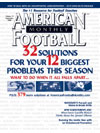AMERICAN FOOTBALL MONTHLY THE #1 RESOURCE FOR FOOTBALL COACHES
Article CategoriesAFM Magazine
|
- More Solutions to Problem #12© More from this issueContinued from: 32 Solutions for the 12 Biggest Problems You'll Face this Season Problem 12: Communication issues between the press box coaches and the sideline coaches...how do you improve this issue? As an offensive staff, which includes our head coach as an offensive position coach, we spend a lot of time in the off-season talking and meeting to fine tune our offensive scheme. During the season we have written game plans that allow us all to get on the same page and work on a platooned daily practice schedule. During game night we have our headphones and we all carry our cell phones just in case the headphones go down. Keith Wheeler, Offensive Coordinator/QB Coach Subscribe today!
|
|
|||||||
| HOME |
MAGAZINE |
SUBSCRIBE | ONLINE COLUMNISTS | COACHING VIDEOS |
Copyright 2026, AmericanFootballMonthly.com
All Rights Reserved





